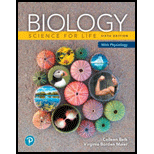
Pearson eText Biology: Science for Life with Physiology -- Instant Access (Pearson+)
6th Edition
ISBN: 9780135214114
Author: Colleen Belk, Virginia Maier
Publisher: PEARSON+
expand_more
expand_more
format_list_bulleted
Concept explainers
Textbook Question
Chapter 11, Problem 1GFO
Search for the biology learning standards published by your state’s department of education. How do these standards address the evidence for evolution? Survey your classmates or others What percentage of your fellow students say that evolution is still not settled science?
Expert Solution & Answer
Want to see the full answer?
Check out a sample textbook solution
Students have asked these similar questions
Diagram of check cell under low power and high power
a couple in which the father has the a blood type and the mother has the o blood type produce an offspring with the o blood type, how does this happen? how could two functionally O parents produce an offspring that has the a blood type?
What is the opening indicated by the pointer? (leaf x.s.)
stomate
guard cell
lenticel
intercellular space
none of these
Chapter 11 Solutions
Pearson eText Biology: Science for Life with Physiology -- Instant Access (Pearson+)
Ch. 11 - What observations did Darwin make on the Galapagos...Ch. 11 - Prob. 2LTBCh. 11 - Prob. 3LTBCh. 11 - In science, a theory is a(n) ___________. educated...Ch. 11 - The theory of common descent states that all modem...Ch. 11 - Prob. 6LTBCh. 11 - Prob. 7LTBCh. 11 - Even though marsupial mammals give birth to live...Ch. 11 - Prob. 9LTBCh. 11 - Which of the following taxonomic levels contains...
Ch. 11 - Prob. 1AAATBCh. 11 - DNA is not the only molecule that is used to test...Ch. 11 - Look at the tree you generated for question 2. It...Ch. 11 - Search for the biology learning standards...Ch. 11 - Humans and chimpanzees are more similar to each...Ch. 11 - The science that you learned in this chapter has...
Knowledge Booster
Learn more about
Need a deep-dive on the concept behind this application? Look no further. Learn more about this topic, biology and related others by exploring similar questions and additional content below.Similar questions
- Identify the indicated tissue? (stem x.s.) parenchyma collenchyma sclerenchyma ○ xylem ○ phloem none of thesearrow_forwardWhere did this structure originate from? (Salix branch root) epidermis cortex endodermis pericycle vascular cylinderarrow_forwardIdentify the indicated tissue. (Tilia stem x.s.) parenchyma collenchyma sclerenchyma xylem phloem none of thesearrow_forward
- Identify the indicated structure. (Cucurbita stem l.s.) pit lenticel stomate tendril none of thesearrow_forwardIdentify the specific cell? (Zebrina leaf peel) vessel element sieve element companion cell tracheid guard cell subsidiary cell none of thesearrow_forwardWhat type of cells flank the opening on either side? (leaf x.s.) vessel elements sieve elements companion cells tracheids guard cells none of thesearrow_forward
- What specific cell is indicated. (Cucurbita stem I.s.) vessel element sieve element O companion cell tracheid guard cell none of thesearrow_forwardWhat specific cell is indicated? (Aristolochia stem x.s.) vessel element sieve element ○ companion cell O O O O O tracheid O guard cell none of thesearrow_forwardIdentify the tissue. parenchyma collenchyma sclerenchyma ○ xylem O phloem O none of thesearrow_forward
- Please answer q3arrow_forwardRespond to the following in a minimum of 175 words: How might CRISPR-Cas 9 be used in research or, eventually, therapeutically in patients? What are some potential ethical issues associated with using this technology? Do the advantages of using this technology outweigh the disadvantages (or vice versa)? Explain your position.arrow_forwardYou are studying the effect of directional selection on body height in three populations (graphs a, b, and c below). (a) What is the selection differential? Show your calculation. (2 pts) (b) Which population has the highest narrow sense heritability for height? Explain your answer. (2 pts) (c) If you examined the offspring in the next generation in each population, which population would have the highest mean height? Why? (2 pts) (a) Midoffspring height (average height of offspring) Short Short Short Short (c) Short (b) Short Tall Short Tall Short Short Tall Midparent height (average height of Mean of population = 65 inches Mean of breading parents = 70 inches Mean of population = 65 inches Mean of breading parents = 70 inches Mean of population = 65 inches Mean of breading parents = 70 inchesarrow_forward
arrow_back_ios
SEE MORE QUESTIONS
arrow_forward_ios
Recommended textbooks for you
 Biology (MindTap Course List)BiologyISBN:9781337392938Author:Eldra Solomon, Charles Martin, Diana W. Martin, Linda R. BergPublisher:Cengage Learning
Biology (MindTap Course List)BiologyISBN:9781337392938Author:Eldra Solomon, Charles Martin, Diana W. Martin, Linda R. BergPublisher:Cengage Learning Human Heredity: Principles and Issues (MindTap Co...BiologyISBN:9781305251052Author:Michael CummingsPublisher:Cengage Learning
Human Heredity: Principles and Issues (MindTap Co...BiologyISBN:9781305251052Author:Michael CummingsPublisher:Cengage Learning Human Biology (MindTap Course List)BiologyISBN:9781305112100Author:Cecie Starr, Beverly McMillanPublisher:Cengage Learning
Human Biology (MindTap Course List)BiologyISBN:9781305112100Author:Cecie Starr, Beverly McMillanPublisher:Cengage Learning Concepts of BiologyBiologyISBN:9781938168116Author:Samantha Fowler, Rebecca Roush, James WisePublisher:OpenStax College
Concepts of BiologyBiologyISBN:9781938168116Author:Samantha Fowler, Rebecca Roush, James WisePublisher:OpenStax College



Biology (MindTap Course List)
Biology
ISBN:9781337392938
Author:Eldra Solomon, Charles Martin, Diana W. Martin, Linda R. Berg
Publisher:Cengage Learning

Human Heredity: Principles and Issues (MindTap Co...
Biology
ISBN:9781305251052
Author:Michael Cummings
Publisher:Cengage Learning

Human Biology (MindTap Course List)
Biology
ISBN:9781305112100
Author:Cecie Starr, Beverly McMillan
Publisher:Cengage Learning

Concepts of Biology
Biology
ISBN:9781938168116
Author:Samantha Fowler, Rebecca Roush, James Wise
Publisher:OpenStax College
Mendelian Genetics and Punnett Squares; Author: Professor Dave Explains;https://www.youtube.com/watch?v=3f_eisNPpnc;License: Standard YouTube License, CC-BY
The Evolution of Populations: Natural Selection, Genetic Drift, and Gene Flow; Author: Professor Dave Explains;https://www.youtube.com/watch?v=SRWXEMlI0_U;License: Standard YouTube License, CC-BY